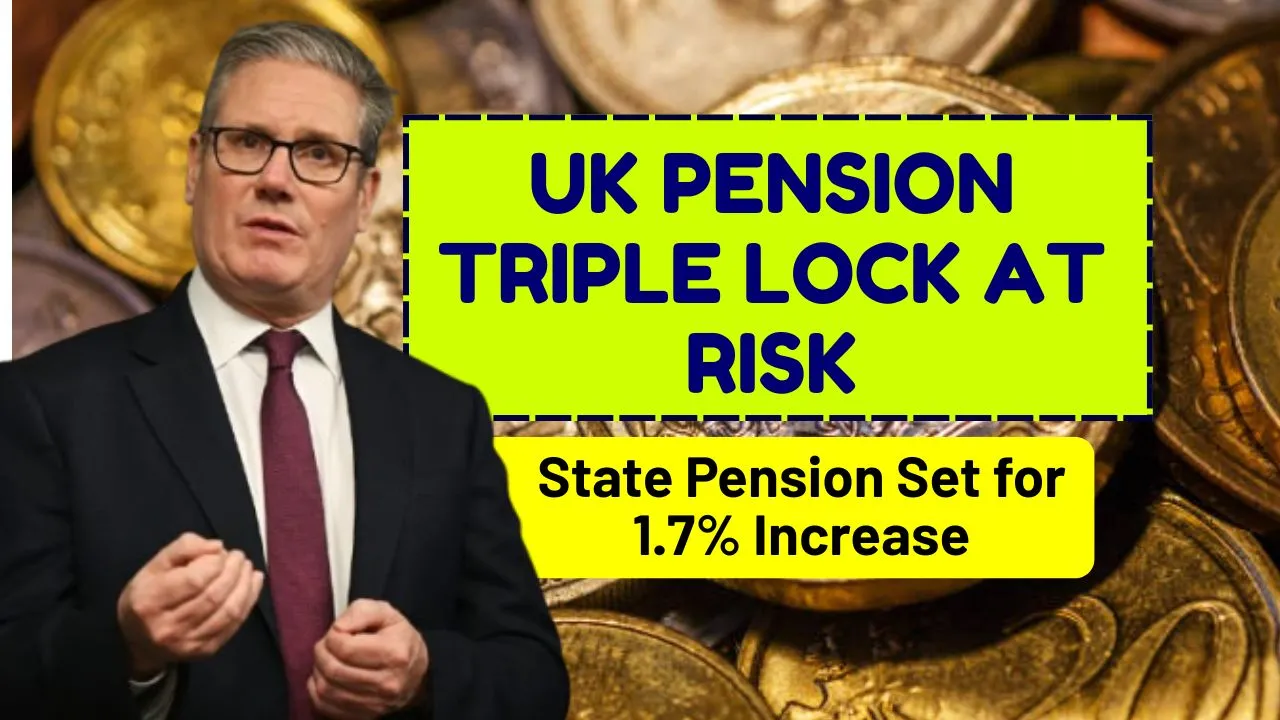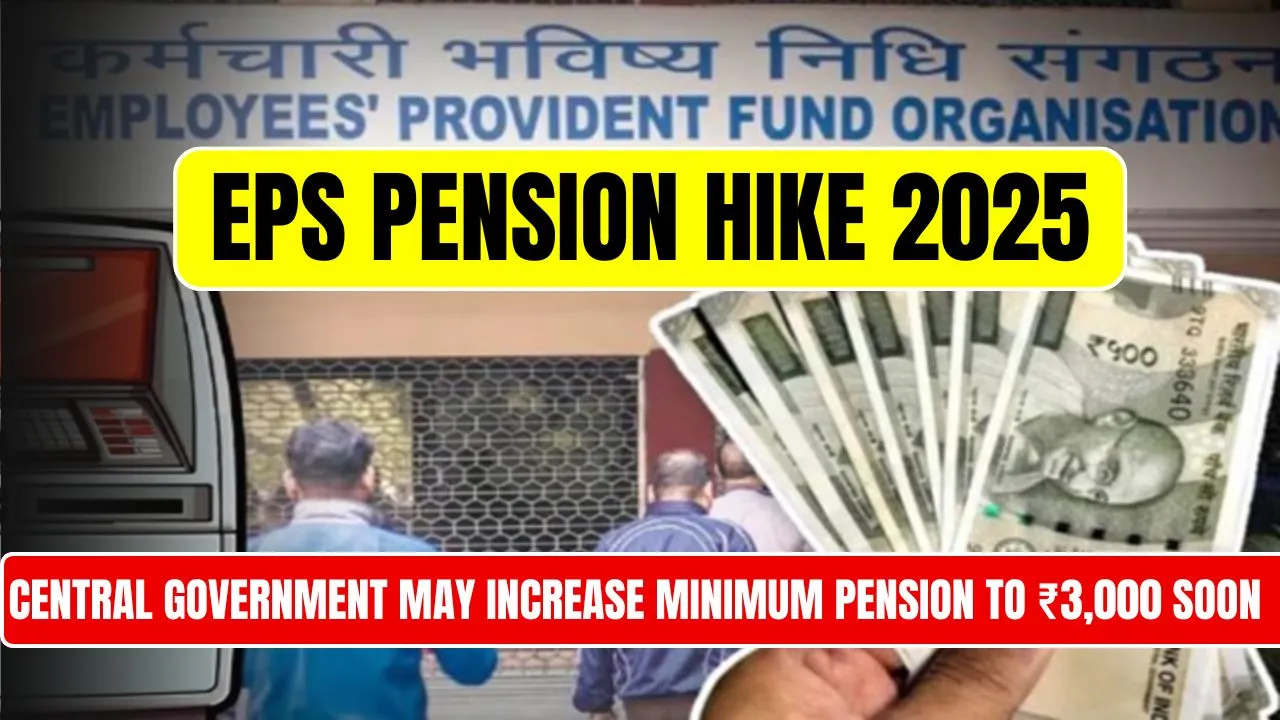UK Pension Triple Lock 2025: The UK’s State Pension system has long relied on the “Triple Lock” to ensure pensioners receive annual increases in their payments, helping their income keep pace with the cost of living. However, this policy may be at a turning point. Recent warnings from government insiders and growing financial pressures suggest the current arrangement may not last much longer.
The UK Pension Triple Lock 2025 is expected to deliver a modest 1.7% increase, based on September’s Consumer Prices Index (CPI). While this ensures a boost for pensioners, political and economic debates around its sustainability continue. This article explains the Triple Lock system, the latest payment updates, and what may lie ahead for UK pensioners.
UK Pension Triple Lock 2025
The UK Pension Triple Lock 2025 refers to the formula used to determine annual increases to the State Pension. Introduced in 2010, the Triple Lock guarantees that pensions rise each year by the highest of:
- CPI inflation (measured each September)
- Average earnings growth (measured from May to July)
- A flat 2.5% increase
For the 2025/26 financial year, the increase is 1.7%, based on the CPI rate. While still providing a rise in payments, this is lower than previous years, and has reignited debates about the future of the policy.
Overview Table: UK Pension Triple Lock 2025 Summary
| Key Factor | Details |
| Policy Name | UK State Pension Triple Lock |
| 2025/26 Increase Basis | 1.7% CPI (September 2024 figure) |
| Full New State Pension (weekly) | £230.25 (up from £221.20) |
| Full New State Pension (annually) | £11,973 (up from £11,502) |
| Full Basic State Pension (weekly) | £176.45 (up from £169.50) |
| Full Basic State Pension (annually) | £9,175 (up from £8,814) |
| Triple Lock Formula | Highest of CPI, average earnings, or 2.5% |
| Proposed Alternatives | Double lock, fixed increase, means-testing |
| Current Political Status | Under review by multiple parties |
What Is the Triple Lock System?
The Triple Lock is a commitment by the government to increase the State Pension each year by the highest of three factors:
- Inflation (CPI) – Protects pensioners against rising living costs
- Average Earnings Growth – Ensures pensions keep pace with wages
- 2.5% Minimum Increase – Guarantees a baseline raise regardless of economic conditions
Since its introduction, it has significantly boosted pensioner incomes, especially during years of low inflation or wage growth.
Why Is the Triple Lock Under Scrutiny?
Although the Triple Lock has been beneficial, it is under increasing pressure for the following reasons:
1. High Costs for the Government
As the UK’s aging population grows, so does the cost of funding pensions. The burden falls heavily on the working-age population through taxes. This has raised concerns about intergenerational fairness and long-term affordability.
2. Political Uncertainty
Several political figures have raised doubts about the future of the Triple Lock:
- Conservative leader Kemi Badenoch hinted at potential means-testing for pension increases.
- Labour’s Pensions Minister Torsten Bell has previously supported scrapping the policy, although Labour recently reaffirmed its commitment.
- Shadow Chancellor Mel Stride called the system “unsustainable” under current conditions.
3. Long-Term Sustainability
Even Sir Steve Webb, former Pensions Minister and one of the architects of the policy, has warned the system may not last forever. He acknowledged it has done its job but noted that large future increases could exceed inflation and wage growth, creating imbalance.
Potential Replacements for the Triple Lock
With the Triple Lock under threat, several alternative models are being discussed:
- Double Lock: Removes the 2.5% guarantee, linking pensions only to inflation and average earnings.
- Fixed Percentage Increase: Applies a consistent annual percentage without relying on economic indicators.
- Means-Testing: Limits increases to low-income pensioners rather than across the board.
While none of these options are confirmed, they reflect growing pressure to reform the system while maintaining fairness.
State Pension Payment Increases for 2025/26
Despite the uncertainty, the government has confirmed a 1.7% increase in State Pension payments for 2025/26:
Full New State Pension:
- Weekly: £230.25 (up from £221.20)
- Four-weekly: £921
- Annual: £11,973
Full Basic State Pension:
- Weekly: £176.45 (up from £169.50)
- Four-weekly: £705.80
- Annual: £9,175
These changes will help protect pensioners from inflation, although the modest rise highlights the limitations of the Triple Lock when inflation is low.
The Triple Lock Has Been a Crucial Policy for Protecting Pensioners’ Income
The Triple Lock has undoubtedly been one of the most impactful policies for older adults in the UK. It has lifted many pensioners out of poverty and helped their income grow in line with the economy. However, the cost of maintaining it—especially during economic downturns or periods of wage surges—has put it under increased scrutiny.
The government’s commitment to continue with the policy remains, but with no firm guarantees beyond the short term, its future depends on political will and economic stability.
Final Thought
The UK Pension Triple Lock 2025 offers pensioners a 1.7% uplift in their payments, securing some financial relief in the coming year. However, the ongoing debate around its affordability and sustainability raises valid concerns for the future.
Pensioners should monitor any policy updates closely and explore other forms of financial assistance, such as Pension Credit, to help maintain a comfortable standard of living. Whether the Triple Lock stays, changes, or is replaced, staying informed is the best way to plan for the years ahead.
FAQs
1. What is the State Pension Triple Lock?
The Triple Lock ensures the UK State Pension increases annually by the highest of inflation (CPI), average wage growth, or 2.5%.
2. Why is the Triple Lock under review?
Rising costs due to an aging population and economic pressure have raised concerns about the system’s long-term affordability and fairness.
3. How much will my State Pension increase in 2025?
For 2025/26, the full New State Pension will rise to £230.25 per week, while the full Basic State Pension will increase to £176.45 per week.
4. Will the UK government scrap the Triple Lock?
There is no official decision to scrap it, but several politicians have questioned its sustainability, and alternatives are being considered.
5. What could replace the Triple Lock?
Possible options include a double lock, a fixed annual increase, or means-tested adjustments targeting only lower-income pensioners.











